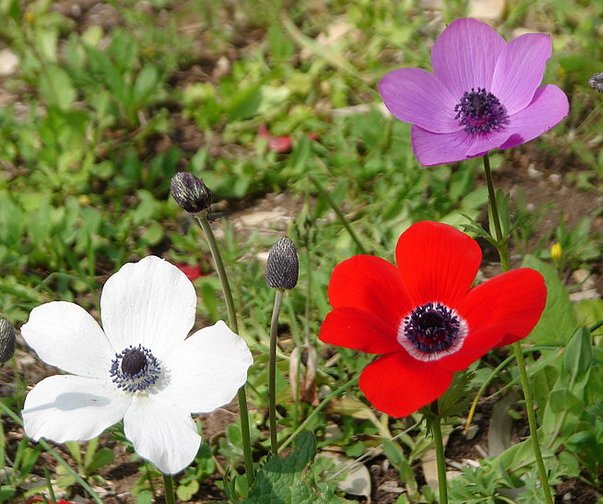Anemone

  | Anemone in TCM:Explore the properties of Anemone according to Chinese
Nutrition and Traditional Chinese Medicine (TCM):
Temperature: cold
Channels: HT, KD
Flavors: bitter
Anemone (Anemone pulsatilla) is a flower also known as Pasque Flower, Wind Flower, Meadow Anemone, Passe Flower, and Easter Flower. It grows wild in the dry soils of almost every Central and Northern country of Europe, and it is known for surviving in extremely windy climates. The whole plant has a strong acrid taste, but is eaten by both sheep and goats, though cows and horses will not touch it. In terms of Chinese medicine this herb is cold in temperature and goes to the heart and kidneys. The root of Anemone is a powerful herb to clear heat from the large intestine, in the core Chinese pharmacopeia, known as Bai Tou Weng
Ellingwood, author of the American Materia Medica, says "In addition to the well known indication, I might say that it is of value in disorders of the reproductive organs which depend upon defective innervation, and which are usually accompanied with manifestations of hysteria or melancholia, or which depend upon sexual derangements and menstrual disorders which are accompanied with loss of strength, chilliness, more or less headache, and gastric derangements, such as nausea, eructation of sour water and other nervous manifestations.
Its best influence is exercised in women of blond temperament, particularly of lax muscular fiber, and of mild and yielding disposition, and smaller doses with these patients will produce better results than larger doses with other patients."
Anemone is known as a medicine to calm the nerves, antispasmodic, alterative and diaphoretic. The tincture of Pulsatilla is beneficial in disorders of the mucous membrane, of the respiratory and of the digestive passages. Doses of 2 to 3 drops in a spoonful of water will allay the spasmodic cough of asthma, whooping-cough and bronchitis. Most sources also agree that Anemone is a very grounding sort of herb that is useful to balance the qi when there is too much energy gathered in the head.
Chestnut school of herbal medicine says "I use anemone to help people ground and calm during panicked states, such as acute anxiety, panic attacks, or after traumatic events. It is my herbal version of the flower essence blend, Rescue Remedy. Many people find that anemone lowers their center of gravity when they are caught in their head or their heart feels way up in their chest. If you are prone to such states, you may want to try anemone when you are feeling dandy to determine a dosage you feel comfortable with."
Some herbalits claim that Anemone is especially useful in cases with a gloomy mentality, brooding disposition, and a tendency to look on the dark side of life. Also sadness, mild restlessness, and a state of mental unrest generally are factors in the condition of the patient requiring Anemone. An anemone patient weeps easily, and the mind is inclined to wander and be unsettled. The pulse is weak, soft, and open, and the tissues have a tendency to dryness (except when the mucous tissues are discharging a thick, bland material). The whole countenance and movements of the body depict sadness, moroseness, despondency, and lack of tone.
Warnings / Contraindications:
This is a low-dose plant, and the dosage is usually somewhere between 1-5 drops, start with 1 drop and use more as needed and appropriate. If overt sedation, confusion or dramatically reduced heart rate occurs, discontinue use. Taken internally in overdoses, it acts as a gastric irritant, producing a sense of rawness, burning, pain in stomach, with endeavors to vomit, all accompanied with marked prostration. Topically applied, the fresh plant of pulsatilla is irritant, and, if kept long in contact with the skin, may produce vesication. When chewed, it produces a benumbing sensation and tingling formication similar to that produced by aconite or prickly ash.
Disclaimer: In accordance with our terms of service, by using this web site you agree that none of the information found on this web site constitutes medical advice. You should always consult your doctor before trying any particular food or herbal remedy to treat disease.
Folk remedies presented on this site are designed to address specifc TCM diagnoses, and are not one-size-fits-all. If you would like to learn more about Traditional Chinese Medicine (TCM) and how it relates to Chinese Nutrition, you can book in a free call with a licensed professional. There is no obligation to purchase.
[CLICK HERE for your free INITIAL CONSULTATION] |

